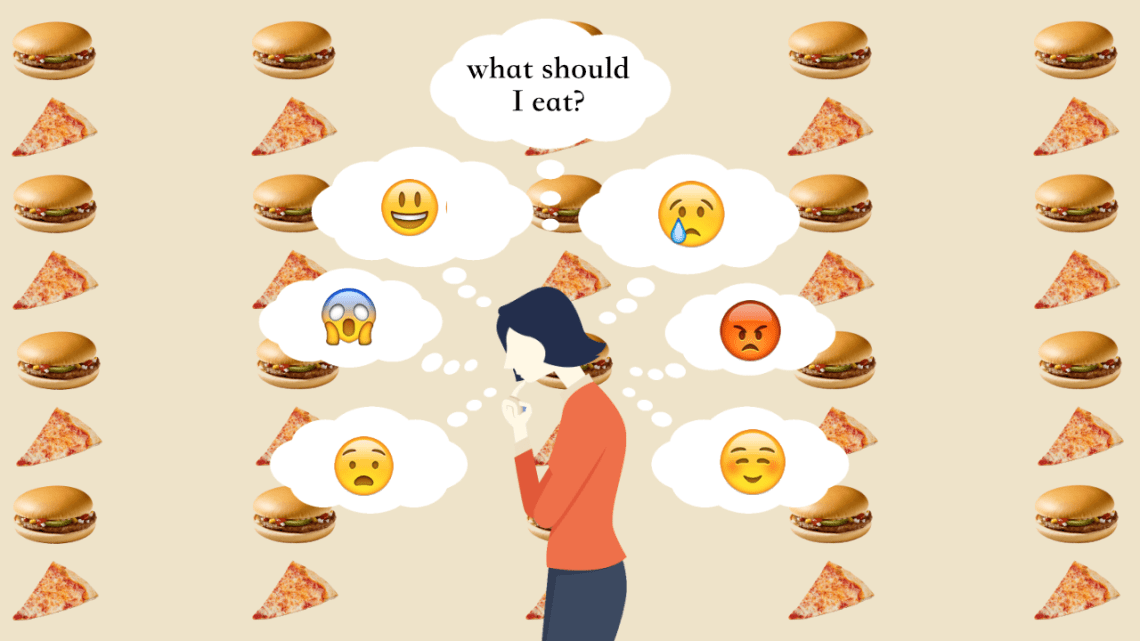Ever thought about why eating slices of pizza makes us feel really calm and sleepy? Or how we get addicted to eating chocolates?
Nutritional Psychology is a relationship between nutrition and our mental health – from carbs, proteins, fiber, fats, what is good for our mental health and what is not? Food psychology, on the other hand, focuses on how our mind can be trained to avoid or consume certain foods in order to feel a certain way. It helps us understand how food evokes feelings and leads us to make different choices in our life.
We might not realize it but the foods we consume are important choices we make for our brain health. The brain consumes about 20-30% of the calories we eat, which is about 400 calories per day. The calories it consumes depends on how rich in minerals and vitamins our food is. Several nutritional factors like B12, zinc, folate are crucial for our brain. Studies have shown that not consuming those vitamins can cause symptoms of depression and dementia – including irritability, fatigue, cognitive decline and low mood.
Omega 3 fatty acids which are found mainly in fish and nuts, are said to be effective in helping alleviate symptoms of Attention Deficit Hyperactivity Disorder, Depressive Disorders, Bipolar Disorder and Post Traumatic Stress Disorder.
Neuroinflammation is an innate immune system reaction to inflammation within the brain or spinal cord due to certain molecular changes. Different studies have shown that too much or constant neuroinflammation can lead to mental health problems. A research particularly studying a woman’s dietary pattern came to the conclusion that an inflammatory diet could lead to neuroinflammation and an increased risk of developing depression over a time period.
An inflammatory diet is foods that are processed and refined and lose its essential nutrients. These foods also usually lead to physiological problems like cardiovascular diseases, blood sugar and blood pressure problems. Healthline noted down a list of foods that cause the most amount of inflammation if consumed in abundance: sugar, trans fats (which exist in oily food like french fries), vegetable oils, refined carbs (bread), processed meat (sausage and bacon) and excessive alcohol.
Inflammation is known as one the age-old ways of defense that our body is already installed with, eating foods that lead to inflammation make our immune system run on overdrive- in order to heal us. No doubt that inflammation can also be caused by our surroundings, like pollution, water we drink or stress – while those variables could be out of our hands, our diet is usually completely our choice. Keep in mind that we might take an extreme step of stopping ourselves from consuming all the foods that lead to inflammation – but minimization of these foods in itself could lead to evoking better feelings and emotions.
Here’s something to think about: the food listed above that might lead to inflammation are also the foods we think of as our “comfort food”. Chocolates, pasta, bread, french fries are the things we like to munch on when we feel stressed, sad or maybe even bored – and that’s true for most of us!
Our liking and craving for comfort food stems from how our body feels when we have them. Research has shown that the brain begins responding to fatty and sugary foods even before they enter our mouth. Merely seeing a desirable item excites the reward circuit. As soon as such a dish touches the tongue, taste buds send signals to various regions of the brain, which in turn responds by releasing the neurochemical dopamine. The results in an intense feeling of pleasure.
Dopamine is a major rewarding chemical and is responsible as the motivator for various addictions – from gambling to cocaine. But, it is a myth that dopamine in itself is addictive. Experiences that make you feel good and gratified activate your brain’s reward center, the nucleus accumbens, which is closely linked to memory and motivation, responds by releasing dopamine. This causes your brain to focus more on the experience itself. You’re left with a strong memory of the pleasure you felt – therefore, wanting to do it more often.
So, eating yummy foods reward us by releasing more dopamine, connecting the pleasure of eating with our memory and leaving us with a “pleasurable high”. This, in turn, makes us want more and more.
Another chemical in our brain, serotonin, is also known as the “feel good” chemical. Serotonin is known to be a mood-regulator. It regulates stress, happiness, sadness, anxiety – all of it! It is also known for roles in blood pressure, sleep cycles and pain sensitivity. Serotonin plays a major role in depression. Serotonin and tryptophan, an amino acid, are highly related. Lowering tryptophan intake in the body, leads to less production of serotonin. Research indicates that together, they are responsible for moods and cognitive abilities.
How is this related to food? Certain foods lead to chemical productions in our body. Eating high carb foods with less intake of proteins, like pizzas, chips, bread, or even candy – leads to insulin secretion with a “plasma tryptophan ratio”, which leads to a surge of serotonin in our body. While a mix of proteins and serotonin keeps the production of serotonin more constant and moderate, only carbs leads to a surge that we like! It suddenly regulates our moods, reduces pain and blood pressure.
Therefore, every time you’re stressed, there’s a higher chance that you grab onto something loaded with carbs. It’s normal, we all do it because that’s what our body is in the habit of. Plus, when we feel relaxed and calm – our body will instantly release dopamine, making us want more and more!
According to The Atlantic, serotonin makes us happy while dopamine makes us feel pleasure. Eating more carbohydrates means double duty for both, serotonin and dopamine. It leads to a tryptophan transport (which means more serotonin!) and also leads to sudden dopamine response for pleasure. But as the dopamine regulates and starts lowering, we end up wanting more sugar for the same pleasure and happiness. This starts a vicious cycle of sugar consumption to generate pleasure and feel happy…and voila, that’s why we always crave sugar once we start eating some.
Now we know that we eat our comfort foods to feel a rush of relaxation or happiness before we go back to feeling the same way we were feeling before, or maybe even a little worse. A good way to handle this is to eat food that leads to a constant and steady release of our feel good chemicals instead of sudden highs and lows. This means apart from eating sugars, fried food, and processed food- we eat natural and healthy sources of carbs. Foods that also have proteins and fiber – slow down the process of gratification and serotonin release. This means we feel the same moods, but it is more constant.
Our first solution to emotional eating might be to completely change our diet and lifestyle 180 degrees – kudos if you have done that and feel better! But, in the long run, most of us find it really hard to continue a rigorous diet after a certain point. Right? Some might even regain all the weight they managed to lose in a shirt span of time – what does this lead to? Low self-esteem, self-confidence and unfortunately, a lot of societal pressure. Sometimes we might not even realise what led to the sudden increase in weight we were trying to reduce all this time.
There are two reasons for this change – our metabolism and appetite. When we suddenly restrict ourselves from eating the foods and calories our body is used to – our body switches to “survival mode”. It increases the appetite hormones (so we feel more hungry) when it senses the loss of muscle and fats and the sudden lack of calories reduces our metabolism in order to save calories for more energy.
Instead, a good way to reduce inflammation and change our lifestyle is to start with replacing processed food with natural food (don’t do this in a small span though – take your time). Our diet is a habit we’ve nurtured, and the first step to changing a diet might be being aware of “comfort foods” we end up eating when we feel emotional, and replacing them slowly with better food.
You're much more likely to be successful at changing your habits if you take things one step at a time. Try to gradually incorporate new habits over time, and before you know it, you will be eating more healthfully…
Another thing to be mindful of is our thought process through “dieting” – the negative association to this world is “weight loss”. Most people diet in order to fit social standards and look better. But here’s a better and more mindful way to look at “dieting” or eating healthy – research says dieting will make you feel invariably better with time!
"Diet, exercise and sleep have the potential to alter our brain health and mental function. This raises the exciting possibility that changes in diet are a viable strategy for enhancing cognitive abilities, protecting the brain from damage, and counteracting the effects of aging.”
Psychology Today states that several systematic reviews of ‘eating healthy’ concluded that eating more proteins, leafy vegetables and fibrous foods improves overall mood and evokes general feelings of happiness. It also reduces symptoms of depression. For example, consuming more foods with Omega 3 fatty acids (like kiwi, walnuts and fish) will help us improve our cognitive skills like learning and memory – which are essential for normal brain functions!
An article by Harvard Medical School said serotonin, another “feel good chemical” in our brain that helps us sleep, eat, feel and reduce pain is produced in our gastrointestinal tract (which is lined with neurons and nerve cells!). So apart from giving us energy to go about our lives, our digestive tract also guides our emotions.
The emotions we feel are due to certain chemicals in our body like serotonin, dopamine, oxytocin and endorphins. And what influences the production of these chemicals? Good bacteria in our gastrointestinal tracts. They play an important role in our health. They fight “bad bacteria” and reduce inflammation, improve neural pathways and absorb all the good nutrients for us.
The Harvard article also states that many studies have compared “traditional diets” like Japanese or Mediterranean diets to the “western diets” and found that risks of developing symptoms of depression is 25% to 30% lower if we follow traditional diets. According to the study, the main reason for this is the high amounts of unprocessed and natural foods that give us our required vitamins and minerals, compared to processed and highly refined food in the western diets.
A 3 year long study Berti et al., in 2018 stated that adults between the age of 30 to 60 years with low adherence to Mediterranean diets showed higher abnormalities in the brain that were related to Alzheimer’s disease, compared to those who adhered more to Mediterranean diets. Another research done by Muñoz et al. in 2008, with a larger population and groups for each – a Mediterranean, mixed and western diet – showed that individuals who adhered to the Mediterranean diet had better physical and mental self perception.
A systematic study done by Ruut Veenhoven in 2019 studied 20 different research with different populations to find if healthy dietary habits in (non-clinical population) leads to happiness. Here, ‘healthy diet’ was defined as “involving’: 1) a varied diet, 2) rich in fruit and vegetables 3) a moderate amount of fats and oil and 4) less salt and sugar than usual these days. The typical Mediterranean diet is considered to fit these demands well.” Happiness was defined as “a) how well one feels most of the time and b) to what extent one perceives one is getting from life what one wants from it.”
This study found out that out of healthy eating habits were positively associated with happiness. This included various experimental and longitudinal studies. While some studies did mention other foods, like soft drinks, leading to happiness – the effect balance (or the effect it had in the long run) was negative.
Daniel G Amen, a psychiatrist who calls himself a “brain warrior”, believes in food as “brain medicine” (take note that this does not mean we follow a diet and stop taking medication – eating healthy food is a good way of adding to better mental health with prescribed medication) and talks about it in detail in many of his books. He gives us seven simple brain-promoting nutritional tips and busts a few myths related to our eating habits.
For example, we eat carb filled foods in the morning – cereal, pancakes, dosas and bread – carbs usually boost serotonin in our brain- which makes us feel calm and relaxed, making us sleepy and lazy for our day of work ahead. On the other hand, we might eat protein like meat, nuts or pulses at the end of the day. Protein boosts dopamine in our body – which keeps us focused, motivated and alert. Amen, in his book “Change Your Brain, Change Your Life” recommends eating protein rich foods in the mornings (like omelettes or oatmeal) while allowing some carbs (like chapati or brown rice) in the night. This would keep us motivated through the day and allow us to sleep well in the night. Again, he emphasizes on avoiding simple carbs like bread and opting for high fiber carbs like vegetables or fruits in order to avoid constant hunger, to feel more satiated and allow better absorption of food in the bloodstream. Just like various research indications, Amen also recommends staying away from processed foods and sticking to natural fruits, vegetables, nuts, meat and green tea.
He also gives a list of all the ‘healthy’ foods that will help us feel better calling them the “mood foods”:
- If you feel anxious or stressed, boost your serotonin with:







